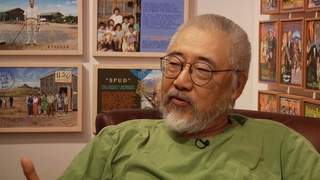Interviews
Californians didn't know about evacuation
You would think most Americans would’ve known, but even people in California didn’t know what happened to the Japanese Americans. It seemed like, you know, they disappeared. And I don’t think the American papers really played up where the Japanese were taken to and that they could only carry just what they could carry, which was very minimal. And I know people in our home town, I mean, we grew up in San Pedro. And yet, when we came back they said, “Oh! Where did you Japanese go? You all disappeared somewhere!” And, I don’t think they realized what this government had done, you know, to put the Japanese people away.
And they may have said it was for our safety, when it wasn’t so—it was almost like a punishment being Japanese and being taken in the same way as they thought of the Japanese from Japan—the enemy. We were—70 percent of us who went into camp—were Americans, I mean we were American citizens, and the rest of them were the Issei‘s born in Japan who America never allowed to be citizens.
Date: June 16, 2003
Location: California, US
Interviewer: Karen Ishizuka, Akira Boch
Contributed by: Watase Media Arts Center, Japanese American National Museum.



